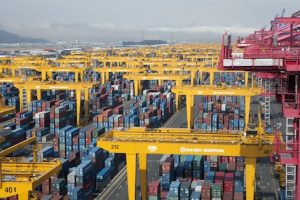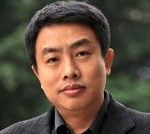Made in China
Government restrictions on drama and entertainment and incentives for factual producers could make China the coproduction destination of choice for the world’s documentary makers. Clive Whittingham reports.

Generation Earth
2012 is the year of the dragon, according to the Chinese calendar. In the world of international coproduction, it seems that 2012 is the year of China.
Usually pretty backwards in coming forwards and swathed in government red tape and regulation, Chinese television has often been a difficult nut to crack for international producers. Likewise, Chinese broadcasters and production houses have found programme quality and cultural differences are difficult barriers to overcome when selling their shows abroad.
But the world’s markets and festivals are now seeing a push from China like never before. At MipTV and MipDoc in April, it was impossible to miss the presence of Chinese state broadcaster CCTV’s documentary channel CCTV9, which launched in January 2011. Last month’s Sunny Side of the Doc had a heavy presence of Chinese executives talking up opportunities in coproduction and distribution.
Liu Wen, MD of CCTV9, tells C21: “One of the main aims this year is to hold several events to make more people aware of us. Attending international documentary festivals means we can increase our exposure, and being within the circle of the documentary world is very important to us.”
CCTV certainly isn’t new to importing factual content. It has been a regular customer of the BBC Worldwide (BBCWW), buying series like Frozen Planet, but previously it tended to cannibalise foreign documentaries and use the footage with its own presenters.
Local productions currently take up about two-thirds of the CCTV9 schedule, with the rest acquired. Wen says the quality of domestic content is improving but there is still a big gap between the Chinese and international productions. “The challenge is the standards of the Chinese documentaries and bringing them up to international standards, which is quite tough,” he says. “International docs not only fill slots but show Chinese producers what international standards are, and hopefully, in the coming years, they can catch up with them.
“The main reason for this gap is that for the past decade the Chinese audience has tended to love dramas and entertainment more than documentaries, so there hasn’t been much scope for documentary producers. Some of the highly qualified doc producers have been spending their time doing promotional work for companies or the government.”

Liu Wen
Small budgets have also been an issue and CCTV9 is charged with investing more in the doc market and nourishing local companies, bringing those skilled producers back into the factual space.
The numbers involved in Chinese television are certainly attractive for the international business. CCTV serves a market of one billion people with 29 free-to-air and 17 pay-TV channels, including a recently launched 3D network. CCTV9 will spend around US$100m on content in 2012 and broadcasts to an average of 63 million people a day. It has the potential to reach as many as 660 million.
But plenty of opportunities exist away from CCTV as well. Hong Kong-based Phoenix Satellite Television airs six channels across China and has worked closely on coproduction with All3Media-owned UK prodco Lion Television. That arrangement helped to create Atlas: China and The First Emperor for Discovery and the UK’s Channel 4.
Renegade Pictures, Alan Hayling’s London prodco, which recently sold a majority stake to Shed Media, has also found copro opportunities among the network of regional and city broadcasters. It made Heroes of the Enlightenment for Beijing Television and Arte in 2011 and Children of the Tsunami for the BBC, Arte and Chongqing Science & Education Channel.
The City TV Stations Association represents seven major networks in the main Chinese cities and 227 local broadcasters.
Li Yiqun, chief editor at Shenyang TV Station, led a 17-strong delegation of executives from those stations to Cannes for April’s MipTV. “The gap between Chinese productions and international ones is getting smaller and smaller,” she says. “We are confident that our own programming can have an international market, but it’s true that in some cases the local productions are made with quite a local flavour and that may not be suitable.”
As you would expect of a regional broadcaster, the bulk of the schedule on the City TV stations is local news and programming, but they also screen international documentaries from the likes of Discovery. “The second part of the objective is to learn what the international market might like and to then strategically produce programmes with that in mind,” Li Yiqun says.
The aims are similar at Guiyang TV, where president Liu Baojing tells C21: “We’re looking for programming that serves local audiences and we’re hoping to establish some long-term foundations for co-operation with international partners. We feel foreign expertise can increase our chances of getting international distribution.”
One of the key advantages to foreign companies of partnering with Chinese broadcasters is the knowledge they bring of the area’s history, culture and regulatory framework. In Xi’an, the home of the Terracotta Army, the local City TV Stations Association member is keen to broaden its horizons. Xi’an TV’s VP Song Zhigang says: “We’ve had success in recent years working with South Korea and we would like to see similar types of cooperation with countries from the West.”
But why are international festivals suddenly besieged by Chinese executives hunting factual coproduction partners? As ever in this part of the world, the country’s Communist government is playing a big role.
In 2010, the State Administration of Radio, Film & Television (SARFT) said that the ratio of domestic to foreign broadcast documentaries, which was heavily weighted in favour of imports, must be reversed and a local production community nurtured. In addition, SARFT started to clamp down on the number of reality, entertainment and drama shows being aired by Chinese channels. This was presented in Western media as a ‘ban on entertainment’ but was more an effort to reduce the number of exploitative gameshows in favour of more educational programming.
In February, SARFT ruled that overseas dramas can be no longer than 50 episodes and cannot air in primetime between 19.00 and 22.00. Imported series should also not exceed more than 25% of a channel’s overall output each day.
Luo Ming, VP and editor-in-chief at CCTV, explains that this could leave big holes in broadcasters’ schedules. “TV dramas are very popular in China and most stations will broadcast up to 12 hours a day. Whenever you switch on your TV there’s going to be TV drama. It’s a huge market in China. International TV dramas have big sales.”
It’s clear that documentaries are the new darling of SARFT, both as a way of promoting China abroad and improving local production standards. Zhigang, at Xi’an TV, says: “We do have some central government policies about promoting Chinese culture internationally and we take that responsibility very seriously.
“For a place like Xi’an, home of the Terracotta Army, it is a requirement that we now produce for the international market. It’s expanding very fast; there is a lot of private capital now entering the production sector. That’s the reason you’re seeing so many Chinese at the markets.”
CCTV9’s Wen adds: “One of the responsibilities of this channel is to invest in the documentary market and nourish local companies.”
But does the government interference go further? Is there an issue of censorship? Political current affairs docs are conspicuous by their absence from the slates promoted by CCTV and others, but according to executives, this is down to audience preference rather than official sensitivity.
“Most Chinese people’s understanding of docs is restricted to wildlife and nature; they don’t regard other kinds of current affairs as documentary. It’s not about government control, it’s about what the audience likes,” says Wen.
This may sound rather convenient for the state broadcaster, but Wen points out that political programming is aired on other CCTV channels, and his assessment is backed up by LI Yiqun. “The main reason foreign docs are not broadcast in primetime is not because of government policy but because the audience’s ability to understand and accept the way those films are made is limited,” she says.
Official sensitivities obviously play a part, however. A delegation of Chinese execs from CCTV9, Phoenix TV and Golden Eagle Documentary Channel was due to attend Sheffield Doc/Fest in the UK in June but withdrew because the festival decided to show Ai Weiwei: Never Sorry, about the Chinese artist and activist. Organisers say the Chinese embassy in London telephoned the day before the festival opened asking them to cancel screenings of the film but the request was refused.
In a statement, festival director Heather Croall said: “Officially, we have been told that the reason they cancelled is related to a restriction on the number of travel trips they can make to Europe. Unofficially though, there were a number of difficult conversations regarding films we are screening in our programme that are critical of the Chinese government.”
The festival’s film programmer Hussain Currimbhoy added: “Editorial independence is critical to the Sheffield Doc/Fest programme and so allowing any delegation of any kind to have influence on the film programme is an idea that we could never contemplate.”
That same delegation went on to make an appearance at Sunny Side of the Doc in France last month. Again, it was the coproduction developments that really caught the eye, with Chinese production groups and broadcasters creating the most interest among execs in La Rochelle. “We have an average audience of 94 million Chinese viewers and buy 1,000 hours a year. We are producing new series and looking for coproduction partners,” said CCTV9′s director of program operations Xiaoqing Chen, offering one example of their financial clout.
Similarly, Chen Dali, exec director of Beijing TV (BTV) Station HD Documentary Channel; Tian Hai, CEO of BJ Raremedia (aka Rare Media); and Ben Tsiang, CEO of Taiwan-based production foundation CNEX, all unveiled new funds and schemes aimed at creating international partnerships.
For now, China’s focus is on nature and natural history, which a cynic may suggest show the country in a positive light. ITV Studios is currently working with CCTV9 and Nat Geo Channels International on China’s Hidden Landscapes: Sinkholes, which focuses on a remarkable area of south-west China where scores of giant holes have opened up in the ground.
Liz McLeod, specialist factual executive producer at ITV Studios, says that patience can bring great rewards when working with Chinese TV. “Filming in China for a UK team brings cultural differences but they are no more difficult to overcome than the cultural differences of a British team filming in America, for example, or a French team filming in Argentina, or a Brazilian team filming in Korea,” McLeod says. “You have to be patient, respectful and polite. Things ran smoothly for us.”
Similar positive stories were told by Mark Reynolds, director of factual programming at BBCWW, which has partnered with CCTV9 on Brian Cox series Wonders of Life, which will premiere this winter, and engineering series Generation Earth, for spring 2013.
An increased emphasis on educational factual programming over reality shows would be welcome in many quarters, although whether a government forcing the hand of its broadcasters can ever be seen as a good thing is debatable.













.jpg)




























